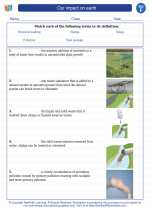Our impact on earth -> nuclear energy
Nuclear Energy
Nuclear energy is the energy that holds together the nucleus of atoms. There are two ways nuclear energy can be released: through nuclear fission or nuclear fusion.
Nuclear Fission
Nuclear fission is the process of splitting the nucleus of an atom into two smaller nuclei, releasing a large amount of energy. This process is used in nuclear power plants to generate electricity. Uranium-235 is commonly used as fuel in nuclear fission reactions.
Nuclear Fusion
Nuclear fusion is the process of combining two light nuclei to form a heavier nucleus. This process releases a huge amount of energy and is the process that powers the sun. While nuclear fusion has the potential to be a clean and abundant source of energy, it is currently not used for commercial energy production due to the high temperatures and pressures required to sustain the reaction.
Advantages of Nuclear Energy
- Produces large amounts of energy from small amounts of fuel
- Relatively low greenhouse gas emissions compared to fossil fuels
- Reliable and consistent source of energy
Disadvantages of Nuclear Energy
- Generation of radioactive waste that requires long-term storage
- Potential for accidents and release of radioactive materials
- High initial construction costs for nuclear power plants
Study Guide
Here are some key points to focus on when studying nuclear energy:
- Understand the processes of nuclear fission and fusion.
- Learn about the types of nuclear reactors and how they work.
- Explore the advantages and disadvantages of nuclear energy.
- Understand the concept of radioactive waste and its management.
- Research the history and development of nuclear energy as a power source.
It's also important to understand the role of nuclear energy in the context of global energy production and its potential impact on the environment and society.
Remember to review and understand key terms such as nuclear fission, nuclear fusion, uranium, reactor, radioactive waste, and radiation.
With a solid understanding of these concepts, you will be well-prepared to discuss and analyze the topic of nuclear energy.
.◂Science Worksheets and Study Guides Sixth Grade. Our impact on earth
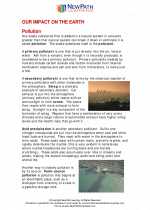
 Worksheet/Answer key
Worksheet/Answer key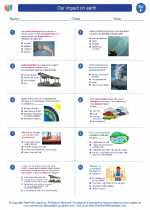
 Worksheet/Answer key
Worksheet/Answer key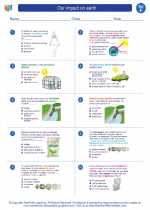
 Worksheet/Answer key
Worksheet/Answer key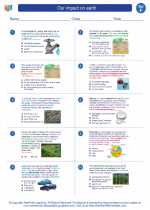
 Vocabulary/Answer key
Vocabulary/Answer key